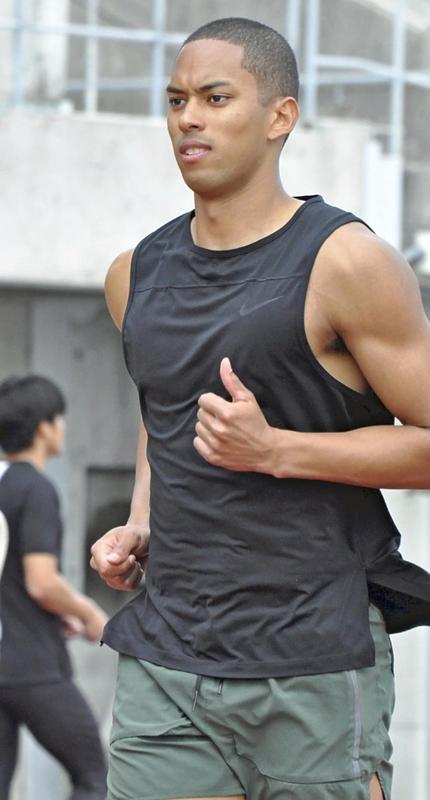
Aska Cambridge, a 26-year-old sprinter who won a silver medal after running in the men's 4x100-meter relay at the Rio de Janeiro Olympics in 2016, has been in a two-year slump. Now striving to compete in short-distance races at the Tokyo Games, he recently expressed his determination to recover and make up for lost ground.
The following is an excerpt from the interview that Cambridge gave to The Yomiuri Shimbun and other media:
Question: Last season, your rivals, such as Abdul Hakim Sani Brown and Yuki Koike, ran 100 meters under 10 seconds. In the final of the men's 100-meter race at the Japan Association of Athletics Federation's championships, you ended up finishing at the back of the pack in eighth.
Cambridge: It was the first time in a long while for me to see the back of almost all other runners at such a big event like the JAAF Athletics Championships. Until then, even when I was in bad condition, I managed to finish within the top three. I wasn't necessarily overoptimistic ... but I had come to a point where I could no longer fake my way through. On the other hand, it might be good for me. As I don't have anything on my mind at the moment, I'm accepting various opinions quite readily.
Q: Until you set a personal best of 10:08 seconds in a 100-meter qualifier at the JAAF 2017 championships, you were looking good. But after that, you fell into a slump, which lasted for quite a while.
A: At that time, I felt like "I could run under 10." But I hurt my leg in the semifinals and it was too good a chance to throw away. Since then, little by little, I began to suffer more injuries than before, and my balance gradually slipped. Over the last two years, I often had pain in my leg and I've felt like I've been forcing my body to work by using my arms.
Q: After the end of last season, you started receiving instructions from Norio Watanabe, a trainer who supported figure skater Daisuke Takahashi.
A: Naturally my balance wasn't very good and I tried various things with Watanabe. I adopted a lot of workouts by focusing on how nervous systems link and the mechanism that interlocks the lower and upper half of the body. At first, I could hardly stand on one leg and realized that I couldn't even achieve such a simple thing. But I feel now that I have learned to control my body better over a few months.
Q: Such efforts seem to be paying off in your performances.
A: For instance, at the start, I am now able to exert all my strength from a low stance better than before. I can now sense better than before that I can exert my strength in the second half of my race. This may be close to how I felt when I was in good shape.
Q: Because of the spread of the new coronavirus, the Tokyo Olympics and Paralympics have been postponed by one year.
A: The decision is unavoidable in this current situation. The only thing I should do is spend my days tackling, as hard as I can, the things that I can change or do, so that when the time comes, I will be able to exhibit the result of my efforts.
Q: What are your aspirations for the future?
A: Of course, I will keep the Tokyo Games in mind, but what I want now more than anything else is, to be able to once again experience the joy of winning a race without getting injured. I aim to achieve results that can make all of the aggravation I've felt over the past two years seem worth it.
Profile: Aska Cambridge
Born in Jamaica. Graduated from Tokyo High School and Nihon University. He won the men's 100-meter race at the 2016 JAAF Athletics Championships for the first time. He won a silver medal as Japan's anchor in the men's 4x100-meter relay at the 2016 Rio de Janeiro Olympics. He turned professional at the end of that year.
Read more from The Japan News at https://japannews.yomiuri.co.jp/







